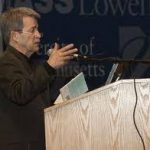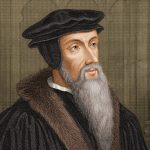Paul Hudon: ‘Diary in the Time of Coronavirus’ (5)
May 18, 2020
by
PaulM
Posted in Culture, Current Events, History, Lowell, Coronavirus 2020
Leave a Comment
Diary in the Time of Coronavirus (5)
by Paul Hudon
*10th May
River hawk glides into view, low-flying, heading west. Spirit lifting visual context. Escape.
*11th May
When Death is roaming the streets of your city, can God thinking be far behind? God, the paramour, the paradox, the paradigm of our species.
God: A Biography (1992) by Jack Miles is a study of ancient Hebrew texts, what Christians call the Old Testament. A scholar of ancient languages, including Hebrew, a former Jesuit, Miles goes looking for God in a close analysis of the texts, and finds a protagonist who behaves just as we do. “It is no exaggeration (and it is certainly not intended to be any insult)” Miles writes, “to say that he does not know who he is. Even to himself, he is a mystery that is revealed progressively only through his actions and their aftermath.” God in this way agrees with Marlow — Conrad’s, not Chandler’s Marlow. Still in the Thames estuary, before setting-out for what turns out to be the heart of darkness, Marlow philosophizes out loud, says he’d rather laze about and loaf, but doesn’t do it because in work you find out who you are. That’s the prize, self-realization. In the epigraph for God: A Biography, Miles quotes Goethe, “In the beginning is the deed.”
The God of the Old Testament, at least according to Miles, is pretty much the same God that John Calvin conjured with back in the sixteenth century. Here is the title of Chapter One in Calvin’s Institutes of the Christian Religion, “The Connection Between The Knowledge Of God And The Knowledge Of Ourselves.” And here is the first sentence, “True and substantial wisdom principally consists of two parts, the knowledge of God, and the knowledge of ourselves. But, while these two branches of knowledge are so intimately connected, which of them precedes and produces the other, is not easy to discover.” Which of them precedes and produces the other. Or, put that in question form: Who calls? Who answers? Or: Who’s the creator here, and Who the creature? Calvin admits this is “not easy to discover,” but Calvin was French (his birth name is Jehan Cauvin), and he earned degrees in law and theology both. And so, while he said it was not “easy” to determine in which direction the creative in.formation flows, he spent his life writing and rewriting the Institutes in Latin and French editions, laying down his discovery in painful detail. He made changes one edition to the next, but that first sentence was invariable. He couldn’t leave it alone.
We humans stand in relation to God as opposite poles of the same knowledge event. Which could begin to explain how it happens that God-obsessed people easily become monsters of self. And explain too how it happens there’s never been a theology without a corresponding anthropology.
John Calvin
*12th May
The TD Bank on Mammoth Road is the only branch in Lowell with a drive-thru. Every day a police detail lines up customers, each in their vehicle, on the west side of the Road. I’ve seen it stretch clear up to Fourth Avenue. Sign of the times I guess. I put it off this week, but I’ll have to join the line next. It’s unavoidable.
*13th May
When Howard Hughes went into his Custom-Built Sunset he went alone, and he paid for it out of pocket. His own pocket. It’s not that way with Trump. Le trompeur is taking all of us Americans with him, and, insult to injury, he’s demanding we to pay for our own destruction. Worse. Because he rules the foreign policy of the state that momentarily engineers global outcomes, his will decides the fate of millions of non-Americans, particularly at the eastern and western ends of Asia. Top it off — irony of epic proportions — he has no idea where he’s doing any of it.
Neither noiseless nor patient but otherwise spider-like in his devotion to spinning a web, Trump obeys the prime-directive, he never leaves home. There’s no outside for Trump. No outside the web, no more than for the spider. Trump operates in the middle of nowhere. Which explains how it happens that, “fact checking Donald Trump is probably most like explaining gravity to a chicken” (http://www.sadlyno.com/archives/41270#comments). Facts don’t enter into his accounting of where he is and what to do there. In Trumpland in.formation flows out, never in.
Summed up this means we’re ruled not by Trump, but by his condition. Trump is a carrier. The vector. As to his condition, start with Dr Bandy Lee. She’s had a lot to say about Trump’s condition. As to consequences start with these two links: Washington Post and independent.co.uk
There’s the record, in the six months since December last year, Trump has not once considered anything but his reelection in making public policy. You and me and aunt Clara are on our own.
*14th May
Poet’s Corner –
“Lift not the painted veil which those that live call life.” Shelley
*15th May
Scott Fitzgerald once described his mid-life crisis — it must have been in The Crack-up — as the “moving about of great secret trunks.” I’m now twice over mid-life but I know what he means. They’re certainly great and secret, and I think they’re trunks.
*16th May
We lost power last night, sometime between eight-twenty and eighty-thirty. It was back this morning just after five. In between time, something like nine hours, I read Georges Simenon, a crime fiction writer whose relentless industry made for 600 hundred million copies of his titles in print and an enormous pile of francs which eventually he took with him to Switzerland.
Simenon — two syllables, sim.non, he insisted on that — was Belgian, like Agatha Christie’s Poirot who insisted on that. Simenon’s cash cow was inspector Maigret of the Parisian police judiciare. Maigret is large, suffers fools not at all, and smokes a succession of pipes in methodical order. Maigret knows who he is.

The Yellow Dog is set in Concarneau in the Finistère Department, where Maigret has been assigned to the garde mobile. There’s been a shooting, apparently random, not fatal, and a pointedly not random attempt at poisoning a trio of local notables. One of them later disappears, only to reappear wandering the streets of Brest. What’s going on here?
Then the yellow dog is shot. The dog, going in and out of the scene, always on scene of the “mishap,” has become the focal point of the public’s fear. This it turns out is Simenon’s quarry. The “virus” of fear which transforms the population of Concarneau, “in less than a day.” An unexpected coincidence, finding the word in print in the light of two 1.5 volt batteries, in lockdown, in Lowell ninety years later after it was written. . . . No more than a coincidence in the logorrhea of Simenon’s work. And which doesn’t tell me whether or not the doctor is guilty.

